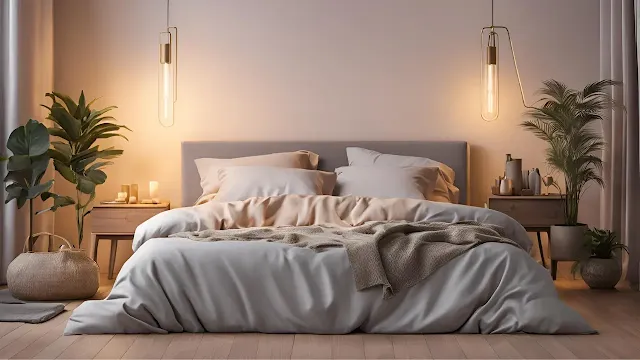Sleep is more than just a nightly ritual; it's a cornerstone of our health and productivity. Have you ever wondered why some days you're bursting with energy while on others you can't seem to focus? The secret often lies in your sleep quality. In this article, we'll delve into the science of sleep and share practical tips for improving your sleep hygiene to boost your productivity. Let's embark on this journey to better sleep and a more productive life.
 |
| The Science of Sleep: Tips for Better Sleep Hygiene to Boost Productivity |
What is Sleep Hygiene?
Definition and Overview
Sleep hygiene refers to a set of practices and habits that are conducive to sleeping well on a regular basis. Think of it as the bedtime routine you never knew you needed but can make all the difference.
The Science Behind Sleep Hygiene
Our bodies are governed by circadian rhythms, 24-hour cycles that regulate sleep and wakefulness. Maintaining good sleep hygiene helps align these rhythms, ensuring you get restorative sleep. Quality sleep affects brain functions like memory, attention, and emotional regulation.
Why Sleep is Crucial for Productivity
Cognitive Benefits
Getting enough sleep sharpens your mind, improves concentration, and enhances problem-solving skills. Lack of sleep, on the other hand, can impair these cognitive functions, making you less productive.
Physical Health Benefits
Sleep is essential for physical health. It aids in muscle repair, boosts the immune system, and helps regulate hormones. Skimping on sleep can lead to health issues like obesity, diabetes, and cardiovascular diseases, all of which can hamper your productivity.
Emotional Well-being
Ever noticed how a good night's sleep can improve your mood? Adequate sleep helps regulate emotions, reducing the likelihood of mood swings and irritability. This emotional stability is key to maintaining a productive mindset.
Common Sleep Disruptors
Blue Light Exposure
Our modern lifestyles are filled with screens – from smartphones to laptops – emitting blue light that interferes with the production of melatonin, the sleep hormone. Reducing screen time before bed can help mitigate this effect.
Irregular Sleep Schedule
Inconsistent bedtimes and wake-up times can disrupt your circadian rhythm. Aim to go to bed and wake up at the same time every day to establish a healthy sleep pattern.
Stress and Anxiety
Stress and anxiety can keep your mind racing at night, making it difficult to fall asleep. Finding ways to manage stress can significantly improve your sleep quality.
Creating a Sleep-Inducing Environment
Optimal Bedroom Conditions
Your bedroom should be a sanctuary for sleep. Keep it cool, dark, and quiet. Consider using blackout curtains, earplugs, or a white noise machine to create the ideal sleep environment.
The Role of Mattress and Pillow Quality
Invest in a good-quality mattress and pillows that provide the right support. An uncomfortable bed can lead to restless nights and morning aches, which aren't conducive to productivity.
Establishing a Consistent Sleep Schedule
Importance of Routine
A consistent sleep schedule reinforces your body's sleep-wake cycle. This routine makes it easier to fall asleep and wake up naturally.
Tips for Maintaining Consistency
Set a bedtime that allows for 7-9 hours of sleep. Avoid drastic changes to your sleep schedule, even on weekends. If you need to adjust your bedtime, do so gradually in 15-minute increments.
Pre-Sleep Routine: Winding Down for Better Sleep
Relaxation Techniques
Incorporate relaxation techniques like reading, gentle stretching, or taking a warm bath into your pre-sleep routine. These activities signal your body that it's time to wind down.
Activities to Avoid Before Bed
Avoid stimulating activities before bed, such as intense exercise, watching thrilling movies, or engaging in stressful conversations. These can keep your mind active and delay sleep.
Diet and Sleep: Foods to Eat and Avoid
Sleep-Promoting Nutrients
Foods rich in tryptophan, magnesium, and melatonin can promote better sleep. Think bananas, almonds, and cherries.
Foods and Drinks that Disrupt Sleep
Limit caffeine and alcohol intake, especially in the hours leading up to bedtime. Heavy or spicy meals before bed can also disrupt your sleep.
Exercise and Sleep: Finding the Right Balance
Benefits of Regular Exercise
Regular physical activity can help you fall asleep faster and enjoy deeper sleep. Exercise also reduces stress, which can improve sleep quality.
Timing Your Workouts for Optimal Sleep
Exercise timing matters. Try to finish vigorous workouts at least three hours before bedtime. Gentle activities like yoga can be beneficial closer to bedtime.
Managing Stress for Better Sleep
Stress Reduction Techniques
Incorporate stress reduction techniques like journaling, deep breathing exercises, or progressive muscle relaxation into your daily routine.
Mindfulness and Meditation Practices
Practicing mindfulness and meditation can calm your mind and body, making it easier to drift off to sleep. Apps like Headspace or Calm can guide you through these practices.
The Role of Technology in Sleep Hygiene
Impact of Devices on Sleep
Using electronic devices before bed can interfere with sleep. The blue light emitted from screens inhibits melatonin production, delaying sleep onset.
Tips for Managing Screen Time
Set a digital curfew an hour before bed. Use blue light filters on your devices, and consider swapping screen time for reading a physical book or listening to soothing music.
Understanding Sleep Disorders
Common Sleep Disorders
Conditions like insomnia, sleep apnea, and restless leg syndrome can significantly impact sleep quality. Recognizing the symptoms is the first step toward addressing them.
When to Seek Professional Help
If you suspect you have a sleep disorder, consult a healthcare professional. Treatments like cognitive-behavioral therapy for insomnia (CBT-I) or CPAP for sleep apnea can improve sleep quality.
Natural Sleep Aids and Remedies
Herbal Teas and Supplements
Herbal teas like chamomile and supplements like melatonin can promote relaxation and improve sleep. Always consult a healthcare provider before starting any supplement.
Aromatherapy and Essential Oils
Aromatherapy using essential oils like lavender or eucalyptus can create a calming atmosphere conducive to sleep. Diffuse oils in your bedroom or apply them to your pillow.
Tracking Your Sleep: Tools and Techniques
Sleep Tracking Devices
Wearable devices and apps can help you monitor your sleep patterns. These tools provide insights into your sleep quality and identify areas for improvement.
Analyzing Your Sleep Patterns
Review the data from sleep tracking devices to understand your sleep habits. Identifying patterns can help you make informed changes to your sleep hygiene routine.
Conclusion
Better sleep is within your reach. By understanding the science of sleep and implementing these sleep hygiene tips, you can improve your sleep quality and boost your productivity. Remember, small changes can make a big difference. Start with one or two tips and gradually incorporate more into your routine. Sweet dreams!
FAQs
How many hours of sleep do adults need?
Most adults need 7-9 hours of sleep per night to function optimally.
Can naps help improve productivity?
Short naps (20-30 minutes) can boost alertness and performance without interfering with nighttime sleep.
What is the best sleeping position?
The best position varies by individual, but sleeping on your back or side can help prevent pain and improve breathing.
How can I reset my sleep schedule?
Gradually adjust your bedtime and wake-up time by 15 minutes each day until you reach your desired schedule.
Are sleep tracking apps reliable?
While not perfect, sleep tracking apps can provide useful insights into your sleep patterns and help you make informed changes.


